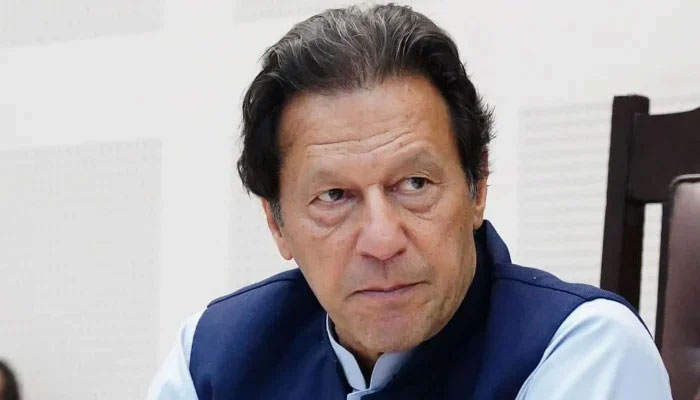Letter from the US
Pakistan’s Foreign Office spokesperson has noted that such interventions are “counter-productive”
A recent letter from more than 60 members of the US House of Representatives urging President Joe Biden to pressure Pakistan for the release of PTI founder Imran Khan has provoked a strong response from Islamabad, the Foreign Office saying that comments on Pakistan’s internal affairs contravene inter-state conduct and diplomatic norms. Pakistan’s Foreign Office spokesperson has noted that such interventions are “counter-productive” and based on an “incorrect understanding” of the domestic political landscape. While the US representatives’ letter is not an official policy stance, it raises questions about the role foreign lawmakers should – or shouldn’t – play in other nations’ domestic politics. This letter isn’t an isolated instance but rather part of a broader trend, with Pakistani officials responding to similar overtures in recent months. For example, in June, the Foreign Office had to address a US House resolution supporting Pakistani democracy and calling for transparent investigations into electoral irregularities. On both occasions, Islamabad was quick to clarify that these moves reflected a lack of insight into Pakistan’s complex political and legal environment. Most political analysts agree that these resolutions and letters are symptomatic of lobbying efforts – especially considering that this is election year in the US and political networks may be leveraging this period to create pressure on Islamabad.
Critics also point out the irony in any appeal by the PTI or its supporters to US lawmakers. Imran Khan, has, after all, been vocal in his past accusations against the US, alleging a conspiracy to unseat him through a no-confidence vote and branding those involved as ‘traitors’. These are weighty accusations, and the abrupt shift from condemnation to soliciting assistance has led many observers to question the PTI’s consistency. There is also a larger concern in all this: such actions have the potential to strain Pakistan’s diplomatic equilibrium, which has been hard-won in recent months. The Foreign Office reaction underscores a wider sentiment in Pakistan, where any foreign interference in domestic affairs tends to be met with scepticism. Pakistan has worked hard to maintain stable relationships with global partners, and the current government has made significant strides to ensure economic and political stability, mitigate internal conflicts, and strengthen regional ties. Inserting an issue as polarising as the PTI leader’s legal woes into international discourse threatens to unravel this progress.
While international lobbying might seem advantageous in the short term, it can foster internal divides, and exacerbate tensions within the country. This tactic also casts a shadow over the PTI’s domestic position, as it portrays a party potentially reliant on external support to resolve internal conflicts, thereby weakening its political credibility and independence. And, as Pakistan continues to navigate a precarious geopolitical environment, such moves seem poorly timed and miscalculated. A diplomatic spat with the US would add undue strain to an already complex foreign policy agenda. Ultimately, the PTI would be better served by addressing its grievances on home soil, within Pakistan’s judicial and political framework. The temptation to seek foreign leverage may be strong, but the consequences of this approach should give pause. While US lawmakers’ statements may not reflect official policy, they reverberate beyond campaign season, underscoring that lobbying efforts by Pakistani parties abroad often come at a high cost to national unity and diplomatic balance. Pakistan’s democracy, if it is to be robust and resilient, needs to settle its issues from within.
-
 Jennifer Hudson Gets Candid About Kelly Clarkson Calling It Day From Her Show
Jennifer Hudson Gets Candid About Kelly Clarkson Calling It Day From Her Show -
 Shamed Andrew Was With Jeffrey Epstein Night Of Virginia Giuffre Assault
Shamed Andrew Was With Jeffrey Epstein Night Of Virginia Giuffre Assault -
 Shamed Andrew’s Finances Predicted As King ‘will Not Leave Him Alone’
Shamed Andrew’s Finances Predicted As King ‘will Not Leave Him Alone’ -
 Bad Bunny Faces Major Rumour About Personal Life Ahead Of Super Bowl Performance
Bad Bunny Faces Major Rumour About Personal Life Ahead Of Super Bowl Performance -
 Sarah Ferguson’s Links To Jeffrey Epstein Get More Entangled As Expert Talks Of A Testimony Call
Sarah Ferguson’s Links To Jeffrey Epstein Get More Entangled As Expert Talks Of A Testimony Call -
 France Opens Probe Against Former Minister Lang After Epstein File Dump
France Opens Probe Against Former Minister Lang After Epstein File Dump -
 Last Part Of Lil Jon Statement On Son's Death Melts Hearts, Police Suggest Mental Health Issues
Last Part Of Lil Jon Statement On Son's Death Melts Hearts, Police Suggest Mental Health Issues -
 Leonardo DiCaprio's Girlfriend Vittoria Ceretti Given 'greatest Honor Of Her Life'
Leonardo DiCaprio's Girlfriend Vittoria Ceretti Given 'greatest Honor Of Her Life' -
 Beatrice, Eugenie’s Reaction Comes Out After Epstein Files Expose Their Personal Lives Even More
Beatrice, Eugenie’s Reaction Comes Out After Epstein Files Expose Their Personal Lives Even More -
 Will Smith Couldn't Make This Dog Part Of His Family: Here's Why
Will Smith Couldn't Make This Dog Part Of His Family: Here's Why -
 Kylie Jenner In Full Nesting Mode With Timothee Chalamet: ‘Pregnancy No Surprise Now’
Kylie Jenner In Full Nesting Mode With Timothee Chalamet: ‘Pregnancy No Surprise Now’ -
 Laura Dern Reflects On Being Rejected Due To Something She Can't Help
Laura Dern Reflects On Being Rejected Due To Something She Can't Help -
 HBO Axed Naomi Watts's 'Game Of Thrones' Sequel For This Reason
HBO Axed Naomi Watts's 'Game Of Thrones' Sequel For This Reason -
 King Charles' Sandringham Estate Gets 'public Safety Message' After Andrew Move
King Charles' Sandringham Estate Gets 'public Safety Message' After Andrew Move -
 Lewis Capaldi Sends Taylor Swift Sweet Message After 'Opalite' Video Role
Lewis Capaldi Sends Taylor Swift Sweet Message After 'Opalite' Video Role -
 Brooklyn Beckham Plunges Victoria, David Beckham Into Marital Woes: ‘They’re Exhausted As It Seeps Into Marriage
Brooklyn Beckham Plunges Victoria, David Beckham Into Marital Woes: ‘They’re Exhausted As It Seeps Into Marriage




